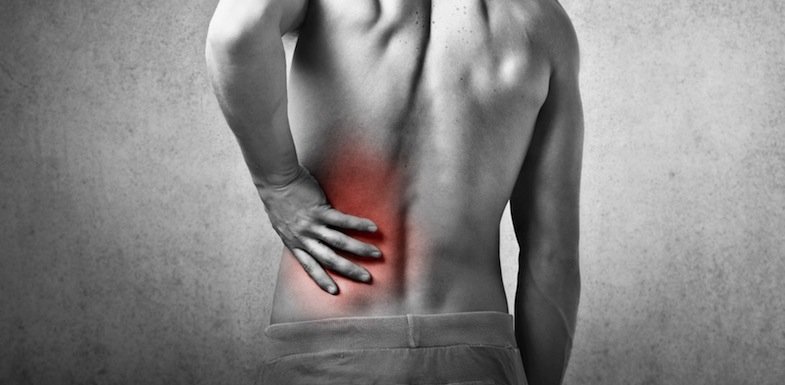Here’s a stat for you. According to the American Chiropractic Association, one half of all working people in the U.S. admit to having back pain symptoms each year. In addition, it turns out that we spend at least $50 billion — that’s billion with a “b” — on back pain. Worse yet? That’s just for identified costs, not all of the ancillary things that come up related to the issue. So what do you do about it? How do you keep yourself from throwing your own money into that $50 billion number and stay healthy? Let’s take a look at some of the ways you can get into the problem in the first place, but also back pain management steps you can take to avoid having the problem in the first place.
Why should I worry about back pain management?
Nearly every person in the U.S. will have back pain at some point in his or her life. Pain symptoms usually lead to a specific area of the back, which can include vertebrae, the spinal cord or back muscles.
The lower back is the most common area for back pain. After the common cold, lower back pain is the leading cause of lost workdays.
One common cause of pain within the lumbar vertebrae is lumbar spinal stenosis. Spines harden with age and can become overgrown. Lumbar spinal stenosis puts pressure on spinal chords because of vertebrae growth. The pressure of stenosis can affect sensitive nerves in the spinal cord, which sometimes causes numbness, as well as cause pain amongst vertebrae.
A herniated disc is another common lower back problem. As the discs in between vertebrae degenerate, they become more likely to rupture and expand. Protruding discs often interfere with the surrounding nerves, causing pain and weakness. Symptoms of herniated discs include muscle spasms, tingling and numbness, and shooting pain in the back and down the legs.
How can I prevent back pain?
Preventive measures and habits are simple. Good posture keeps the back strong and in proper alignment. When lifting an object, bend at the knees and keep the back straight and protect lumbar vertebrae.
Core exercises strengthen the back muscles around the spine, which protects the spine and maintains mobility. Avoid chronic pain by taking proper rest and treatment when back pain occurs. Simple problems like muscle strains cause back pain, and ice can be applied to limit inflammation.
Practice proper lifting techniques
We’ve all made mistakes when it comes to lifting heavy items, and felt the consequences later. Instead of falling prey to the same problem over and over, it’s easy enough to just learn the right way to lift a heavy object, so you just fall into the habit.
So what’s the right way to lift?
- Get as close to the object as you can. Place one knee on the ground and then put your other foot on the floor so that you’re kneeling with one knee down.
- Hold your stomach, back and pelvis muscles tight and pull the object up between your legs. Make sure that your back isn’t slouched over, and is instead holding its natural curve. Also, make sure the object is held close to your body, and rest it on your knee as you start to stand.
- Lift with your legs — this is key, because if you lift with your back you’ll be in trouble. Keep your back in that original curved position as well.
Lighten up purses and bags
Did you know your purse or bag may be part of the problem? Anyone who carries around a lot of weight on a daily basis — a laptop bag, diaper bag, heavy purse — is putting additional strain on their lower back.
This is a particular issue if you throw the item over just one shoulder or the other, as opposed to a backpack — which is an equally bad issue, but it just distributes the load evenly. If every day you have to carry around something heavy, consider switching to a rolling bag or something similar.
Keep exercise consistent in your life
Some back pain issues are the result of strain on the lower back or muscle related. By keeping flexible and working out those muscles, you’ll do yourself a world of good.
Consider yoga. It’s a low impact way of keeping flexible and working out, plus it’s something anyone can do from their home or at the gym. The goal, according to Gaiam.com, is to focus on your core strength and length. This means that you want to work out your abs, low and mid back, and side waist, but you still want to keep your abdominal muscles lean. A few poses to consider are the Pigeon, Downward Facing Dog and Wall Plank.
If yoga isn’t your bag, you can also hit the gym. Again, the goal is to work on your core so that you have the strength in your back to begin with. But don’t push yourself so hard that you get hurt — you don’t want to make your problem worse before it gets better.
Manage your weight
The spine is the core of your body, and does all of the heavy lifting for you. If you happen to be heavy yourself, then you’re putting extra strain on not only your spine, but the discs between your vertebrae and the surrounding nerves.
By lightening up your mass, you’ll also put less pressure on your body and keep things functioning well longer.
Avoid sitting, as much as possible
Sitting is killing you. Alright, that may be a bit extreme, but people who spend more than six hours a day sitting have a higher death rate than those who spend just three doing the same activity. Plus, there’s all the extra strain, added weight and so on that occurs just from living a sedentary lifestyle. Then there’s your back.
Think about how you sit at your desk. Chances are pretty good that you may try to use the best ergonomic position possible, but it doesn’t often happen that way, right? You end up slouched over, maybe kicked back with your feet extended and neck cranked down to your chest. It’s definitely not a good thing to do to your spine on a regular basis, and yet, here we are.
Try a standing desk
So what’s the answer? Standing desks. It may sound counter intuitive, but getting and using a standing desk can certainly improve your posture, keep your circulation flowing and just generally feel better.
For the uninitiated to the world of standing desks, picture a podium. That’s a standing desk. Or, imagine your existing desk at a height where you can type or write with your elbows at a 90-degree angle to the work surface. That’s essentially the concept here, and many famous people have used this concept over the years. Ernest Hemingway is famous for his, and both Thomas Jefferson and Winston Churchill used them as well. In fact, there were quite a few businesses during the industrial revolution that used convertible standing desks as their primary tool. So how do you make the transition?
First, you have to decide whether or not you can make the jump full time. Not everyone can, and in those cases you have a few different options. Geekdesk (Geekdesk.com) makes a convertible standing desk that’s electrically adjustable. It’s not cheap — around $750 to start — but it is one of the more inexpensive electric versions available. Or you could go with a Kangaroo by Ergo Desktop (Ergodesktop.com), which is a less expensive route to go. Finally, you could just try things out by working off of a countertop or bar top for a bit, and see how it goes.
Either way, at least attempting to curb your time at a desk is a good thing, and will help out with your back as well. Who wants to spend less time on the earth because they spent more time at a desk, anyways?
Learn more about alternative therapies
If you’re already the victim of a back issue, the next step is to seek out help. So where do you go to get things sorted out? You’d think the chiropractor, right? Well yes. And no.
Step one should be to a pain clinic in your area. A pain practice has multiple doctors under one roof, all from different disciplines. In some pain practices, you’ll have a chiropractor right there on hand, too.
But why the pain practice over just seeing your general practitioner or a solo chiropractor? Because you could have something wrong that just one person can’t fix. A traditional chiropractor may not be able to offer acupuncture or spinal cord stimulators, for example, and your regular physician will likely send you off to see a specialist anyways. At a pain practice, you have options — lots of them.
Get help today
Whatever the case may be, if you have a back problem, you should get help today to get started on back pain management. And if you’ve been lucky so far, it’s time to be proactive about your back. Injuring yourself can put you down for a long time, so handle things before they get bad.
To get started today, contact our pain clinic for more information.

